Emma Hale
|
|
|
Isaac Hale testimony
|
|
Isaac Hale, witnessed by Charles Dimon
|
|
20 Mar, 1834
|
I first became acquainted with Joseph Smith, Jr. in November, 1825... Smith, and his father, with several other 'money-diggers' boarded at my house while they were employed in digging for a mine that they supposed had been opened and worked by the Spaniards, many years since... They then became discouraged, and soon after dispersed. This took place about the 17th of November, 1825...
After these occurrences, young Smith made several visits at my house, and at length asked my consent to his marrying my daughter Emma. This I refused, and gave my reasons for so doing; some of which were, that he was a stranger, and followed a business that I could not approve; he then left the place. Not long after this, he returned, and while I was absent from home, carried off my daughter, into the state of New York, where they were married without my approbation or consent. After they had arrived at Palmyra N.Y., Emma wrote to me enquiring whether she could take her property, consisting of clothing, furniture, cows, &c. I replied that her property was safe, and at her disposal. In a short time they returned, bringing with them a Peter Ingersol, and subsequently came to the conclusion that they would move out, and reside upon a place near my residence.
Smith stated to me, that he had given up what he called "glass-looking," and that he expected to work hard for a living, and was willing to do so. He also made arrangements with my son Alva Hale, to go to Palmyra, and move his (Smith's) furniture &c. to this place. He then returned to Palmyra, and soon after, Alva, agreeable to the arrangement, went up and returned with Smith and his family. |
|
|
|
|
|
|
Recollections of the pioneers of Lee County
|
|
Inez A. Kennedy
|
|
1893
|
Emma Hale, the sister of Elizabeth Wasson, was born in the town of Harmony, Susquehanna county, Pennsylvania, July 10, 1804. Her parents, Mr. Isaac and Mrs. Elizabeth (Lewis) Hale, were pioneers of a self-reliant race, brave, honest, of unshaken fidelity and unquestioned integrity. She grew to womanhood amid the rural scenes, labors and recreations incident to farm life on the banks of the Susquehanna River. She was a good horse-woman, and a canoe on the river was her plaything. She was a fair scholar for the common schools of the time, and a good singer and possessed of a fine voice. She was of excellent form, straight and above medium height, features strongly marked, united with her kindness of heart and splendid physical developments commanded both admiration and respect.
In 1825 Miss Hale became acquainted with Joseph Smith, celebrated in the history of the religions of the United States, as the founder of "Mormonism," "The Church of Jesus Christ of Latter Day Saints," to whom she was married in the town of South Bainbridge, New York, at the residence of 'Squire Tarbell, January 18, 1827. Mrs. Smith lived in the family of her husband's parents, at Manchester, New York, until December, when they moved to Harmony, Pennsylvania, and settled near her father's farm. |
|
|
|
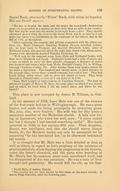
|
|
External Link
|
|
History of Susquehanna County, Pennsylvania, Emily C. Blackman, pg 103
|
|
|
|
|
History of Susquehanna County
|
|
Emily C. Blackman
|
|
1873
|
Emma, was intelligent, and, that she should marry Joseph Smith, Jr., the Mormon leader, can only be accounted for by supposing "he had bewitched her," as he afterward bewitched the masses.
It is thought that Mr. Hale was a little deluded at first, as well as others, in regard to Joe's prophecy of the existence of precious minerals, when digging was progressing in the vicinity, under the latter's direction, and the party were boarding at Mr. Hale's, but his common sense soon manifested itself, and his disapproval of Joe was notorious. He was a man of forethought and generosity. |
|
|
|
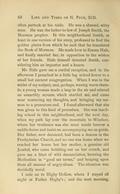
|
|
External Link
|
|
The Life and Times of Rev. George Peck, D.D., pg 68
|
|
|
|
|
George Peck Account
|
|
George Peck
|
|
1874
|
|
(Isaac Hale) was a shrewd, witty man. He was the father-in-law of Joseph Smith, the Mormon prophet. In this neighborhood Smith, at least in one version of his story, professed to find the golden plates from which he said that he translated the Book of Mormon. He made love to Emma Hale, and finally married her, in opposition to the wishes of her friends. Hale himself detested Smith, considering him an impostor and a knave. |
|
|
|
|
|
|
Peter Ingersoll testimony
|
|
Peter Ingersoll, witnessed by Th. P. Baldwin
|
|
9 Dec, 1833
|
In the month of August, 1827, I was hired by Joseph Smith, Jr. to go to Pennsylvania, to move his wife's household furniture up to Manchester, where his wife then was. When we arrived at Mr. Hale's, in Harmony, Pa. from which place he had taken his wife, a scene presented itself, truly affecting. His father-in-law (Mr. Hale) addressed Joseph, in a flood of tears: "You have stolen my daughter and married her. I had much rather have followed her to her grave. You spend your time in digging for money - pretend to see in a stone, and thus try to deceive people." Joseph wept, and acknowledged he could not see in a stone now, nor never could; and that his former pretensions in that respect, were all false. He then promised to give up his old habits of digging for money and looking into stones. Mr. Hale told Joseph, if he would move to Pennsylvania and work for a living, he would assist him in getting into business. Joseph acceded to this proposition. I then returned with Joseph and his wife to Manchester...
Joseph told me on his return, that he intended to keep the promise which he had made to his father-in-law; but, said he, it will be hard for me, for they will all oppose, as they want me to look in the stone for them to dig money: and in fact it was as he predicted. |
|
|
|
|
|
|
Willard Chase testimony
|
|
Willard Chase, witnessed by Fred'k Smith
|
|
11 Dec, 1833
|
About this time he went to Harmony in Pennsylvania, and formed an acquaintance with a young lady, by the name of Emma Hale, whom he wished to marry. In the fall of 1826, he wanted to go to Pennsylvania to be married; but being destitute of means, he now set his wits to work, how he should raise money, and get recommendations, to procure the fair one of his choice. He went to Lawrence with the following story, as related to me by Lawrence himself. That he had discovered in Pennsylvania, on the bank of the Susquehannah River, a very rich mine of silver, and if he would go there with him, he might have a share in the profits; that it was near high water mark and that they could load it into boats and take it down the river to Philadelphia, to market. Lawrence then asked Joseph if he was not deceiving him; no, said he, for I have been there and seen it with my own eyes, and if you do not find it so when we get there, I will bind myself to be your servant for three years. By these grave and fair promises Lawrence was induced to believe something in it, and agreed to go with him. L. soon found that Joseph was out of money, and had to bear his expenses on the way. When they got to Pennsylvania, Joseph wanted L. to recommend him to Miss H., which he did, although he was asked to do it; but could not well get rid of it as he was in his company. L. then wished to see the silver mine, and he and Joseph went to the river, and made search, but found nothing. Thus, Lawrence had his trouble for his pains, and returned home lighter than he went, while Joseph had got his expenses borne, and a recommendation to his girl.
Joseph's next move was to get married; the girl's parents being opposed to the match: as they happened to be from home, he took advantage of the opportunity, and went off with her and was married.
Now, being still destitute of money, he set his wits at work, how he should get back to Manchester, his place of residence; he hit upon the following plan, which succeeded very well. He went to an honest old Dutchman, by the name of Stowel, and told him that he had discovered on the bank of Black River, in the village of Watertown, Jefferson County, N.Y. a cave, in which he had found a bar of gold, as big as his leg, and about three or four feet long. That he could not get it out alone, on account of its being fast at one end; and if he would move him to Manchester, N.Y. they would go together, and take a chisel and mallet, and get it, and Stowel should share the prize with him. Stowel moved him.
A short time after their arrival at Manchester, Stowel reminded Joseph of his promise; but he calmly replied, that he would not go, because his wife was now among strangers, and would be very lonesome if he went away. Mr. Stowel was then obliged to return without any gold, and with less money than he came. |
|
|
|
|
|
|
Alva Hale testimony
|
|
Mormonism Unvailed
|
|
1834
|
|
Alva Hale, son of Isaac Hale, states, that Joseph Smith Jr. told him that his (Smith's) gift in seeing with a stone and hat, was a gift from God," but also states "that Smith told him at another time that this "peeping" was all d----d nonsense. He (Smith) was deceived himself but did not intend to deceive others ;--that he intended to quit the business, (of peeping) and labor for his livelihood. |
|
|
|
![I was twenty one years of age and in this year I was married to Emma Hale Daughter of Isaach Hale who lived in Harmony Susquehana County Pensylvania on the 18th [of] January AD. 1827](images/1832_eh_thumb.jpg)
|
|
External Link
|
|
The Joseph Smith Papers, History, circa Summer 1832, pg 5
|
|
|
|
|
Joseph Smith 1832 account
|
|
Joseph Smith Jr.
|
|
1832
|
|
I was twenty one years of age and in this year I was married to Emma Hale Daughter of Isaach Hale who lived in Harmony Susquehana County Pensylvania on the 18th [of] January AD. 1827 |
|
|
|
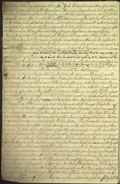
|
|
External Link
|
|
The Joseph Smith Papers, History, 1838-1856, volume A-1 [23 December 1805-30 August 1834], pgs 7 & 10
|
|
|
|
|
1838 canonized account
|
|
Joseph Smith Jr.
|
|
1838
|
In the month of October Eighteen hundred and twenty five I hired with an old Gentleman, by name of Josiah Stoal...
During the time that I was thus employed I was put to board with a Mr Isaac Hale of that place, Twas there that I first saw my wife, (his daughter) Emma Hale. On the eighteenth of January Eighteen hundred and twenty seven we were married while yet I was employed in the service of Mr Stoal. Owing to my still continuing to assert that I had seen a vision, persecution still followed me, and my wife's father's family were very much opposed to our being married, I was therefore under the necessity of taking her elsewhere, so we went and were married at the house of Squire Tarbill. in South Bainbridge. Chenango County. New York. Immediately after my marriage I left Mr Stoals, and went to my father's and farmed with him that season. |
|
|
|
|
|
|
Emma's Last Testimony
|
|
Emma Hale Smith
|
|
9 Feb, 1879
|
I was married at South Bainbridge, New York; at the house of Squire Tarbell, by him, when I was in my 22d or 23d year...
I think the date correct. My certificate of marriage was lost many years ago, in some of the marches we were forced to make...
I was visiting at Mr. Stowell's who lived in Bainbridge, and saw your father there. I had no intention of marrying when I left home; but, during my visit at Mr. Stowell's, your father visited me there. My folks were bitterly opposed to him; and, being importuned by your father, sided by Mr. Stowell, who urged me to marry him, and preferring to marry him (than) to any other man I knew, I consented. We went to Squire Tarbell's and were married. Afterward, when father found that I was married, he sent for us. The account in Mother Smith's history is substantially correct as to date and place. Your father bought your Uncle Jesse's (Hale) place, off father's farm, and we lived there until the Book of Mormon was translated; and I think published. I was not in Palmyra long." |
|
|
|
|
No Preview Available
|
|
External Link
|
|
Naked Truths About Mormonism, Vol 1, No 1, pg 2, col 5
|
|
|
|
|
William Hine's statement
|
|
William Riley Hine, witnessed by A. B. Deming
|
|
Jan, 1888
|
|
Emma was fine looking, smart, a good singer, and she often got the power. Jo stole his wife, Sunday, while Hale was at church. My wife and I saw him on an old horse with Emma on behind as they passed our house on their way to Bainbridge, N.Y., where they were married. |
|
|
|
(Note:
No images of this source are available online. Please contact me if you have any information.)
|
|
|
|
|
|
|
Pennsylvania Newspaper Account
|
|
Independent Republican
|
|
Dec 6, 1869
|
|
He married Emma, daughter of Jesse Hale, a famous hunter in the early days of the country, who lived on the north side of the river, a little below the Susquehanna Depot. Her family were much opposed to the match, but she was determined to marry the scapegrace, and did, though she had to escape down the river in a canoe to do it. |
|
|
|
(Note:
This is a reprint in the Pittsburgh Weekly Gazette. No images of the original article in the Independent Republican appear to be available online. Please let me know if you have any information.)
|
|
|
|
|
|
|
Lorenzo Saunders Interview
|
|
Lorenzo Saunders
|
|
20 Sep, 1884
|
|
Joseph's wife was a pretty woman, just as pretty a woman as I ever saw. When she came to the Smiths she was disappointed and used to come down to our house and sit down and cry. Said she was deceived and got into a hard place. |
|
|
|
(Note:
This is from an unpublished affidavit that in the 1970's was in the library of the Reorganized LDS church. No image appears to be available online. Please contact me if you have any information regarding this source.)
|
|
|
|
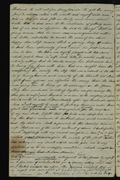
|
|
External Link
|
|
The Joseph Smith Papers, Lucy Mack Smith, History, 1844-1845, pgs 51-52
|
|
|
|
|
Lucy Mack Smith account
|
|
Lucy Mack Smith
|
|
1844-45
|
When the time had nearly come that rendered it necessary for my Husband to set out for Pensylvania to get the money Joseph called Mr. Smith and myself aside and told us that he had felt so lonely ever since Alvin's death that he had come to the conclusion of getting married if we had no objections and he though that no young woman that he ever was acquainted with was better calculated to render the man of her choice happy than Miss Emma Hale a young lady of whom he had been extremely fond of since his first introduction to her His Father was highly pleased with the choice which Joseph made in a wife and told him he would was not only willing that he should marry her but desired him to bring her home with him that we might have the pleasure of her society this Miss Hale was a resident in the state of Pennsylvania and vicinity of Mr Stowell and Knight from whom we expected the money that Mr. Smith was going after to bring up the arrearages on the farm They then concluded to set off together and they did so as soon as the necessary preparations could be made...
Now Joseph who returned from his journey with his Father began to turn his mind to the same object again which occupieid his attention previous to our disaster And he set out for Pennsylvania a second time and had such fine success that he returned with his wife in January in fine health & spirits
|
|
|
|
|
|
|
Lippincott's Monthly Magazine
|
|
Frederic G. Mather
|
|
Aug, 1880
|
|
There was, however, another object for which Smith said the Lord had sent him to Susquehanna; and that was -- a wife. Until he obtained one there was no use in trying to get certain buried treasures at Palmyra. A headless Spaniard guarded it with great vigilance, but would, it appeared, be driven away if Smith should shake millinery and dry-goods bills at him. Joseph stopped at the house of Isaac Hale, already noticed as having furnished board to the diggers. Mr. Hale owned a farm. on the north side of the river, a mile and a half below the present borough of Susquehanna. He had three daughters, two of them already married. The second daughter, Emma, was easily persuaded to join her fortunes with those of the adventurer. The father, however, made so much opposition that they crossed over into the State of New York, and were married at Windsor, a neighboring town. This was probably early in 1826. Mr. Hale threatened to shoot his son-in-law the "Peeker," as he called him -- if he ever returned. |
|
|
|
|
|
|
Hiel and Joseph Lewis account
|
|
Hiel and Joseph Lewis
|
|
23 Apr, 1879
|
|
But while he was engaged in looking through his peep-stone and old white hat, directing the digging for money, and boarding at uncle Isaac Hale's, he formed an intimacy with Mr. Hale's daughter, and after the abandonment of the money-digging speculation, he consummated the elopement and marriage to the said Emma Hale, and she became his accomplice in his humbug Golden Bible and Mormon religion. |
|
|
|
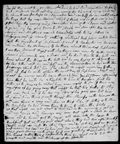
|
|
External Link
|
|
Joseph Knight reminiscences, Church History Library, pg 3
|
|
|
|
|
Joseph Knight Account
|
|
Joseph Knight
|
|
1833-1847
|
|
Joseph then went to Mr Stowels whare he had lived sometime Before but Mr Stowel Could not pay him money for his work very well and he came to me perhaps in November and worked for me until about the time that he was Married which I think was in February and I paid him the money and I furnished him with a horse and Cutter to go and see his girl Down to Mr. Hails and soon after this he was Married and Mr Stowel moved him and his wife to his fathers in Palmyra Ontario County |
|
|
|
|
|
|
Recollection of Mrs. Doolittle
|
|
Broome Republican
|
|
28 Jul, 1880
|
|
Mrs. Methetable Doolittle, who is now living alone on a little place in Susquehanna borough, lived in Wurtsboro, Sullivan county, and visited at the house of Isaac Hale, Joe Smith's father-in-law, when she was seventeen years old. She remembers Emma, afterwards the wife of the Prophet, as a handsome and attractive girl, about her own age. She says Emma was decoyed away for a ride, and married in Windsor, very much against the wishes of her parents. |
|
|
|
|
|
|
Interview with Joseph Smith Sr.
|
|
Fayette Lapham
|
|
May, 1870
|
|
During that year, Joseph went to the town of Harmony, in the State of Pennsylvania, at the request of some one who wanted the assistance of his divining rod and stone in finding hidden treasure, supposed to have been deposited there by the Indians or others. While there, he fell in company with a young woman; and, when he first saw her, he was satisfied that she was the person appointed to go with him to get the treasure he had so often failed to secure. To insure success, he courted and married her. |
|
|
|
|